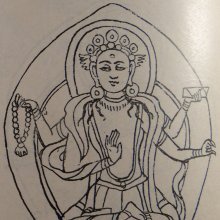Pupala, Pūpalā: 7 definitions
Introduction:
Pupala means something in Buddhism, Pali, Hinduism, Sanskrit. If you want to know the exact meaning, history, etymology or English translation of this term then check out the descriptions on this page. Add your comment or reference to a book if you want to contribute to this summary article.
Images (photo gallery)
In Buddhism
Tibetan Buddhism (Vajrayana or tantric Buddhism)
Source: archive.org: The Indian Buddhist IconographyPupala (पुपल) or Pupalalokeśvara refers to number 24 of the 108 forms of Avalokiteśvara found in the Machhandar Vahal (Kathmanu, Nepal). [Machhandar or Machandar is another name for for Matsyendra.].
Accordingly,—
“Pupala is one-faced and four-armed and sits in the Vajraparyaṅka attitude on a lotus. One of his two right hands carries the rosary while the other exhibits the Abhaya pose. One of the two left carries the book and the other displays a mudrā with the index and little fingers pointing outwards (Karaṇa ?)”.
The names of the 108 deities [viz., Pupala] possbily originate from a Tantra included in the Kagyur which is named “the 108 names of Avalokiteshvara”, however it is not yet certain that this is the source for the Nepali descriptions. Tibetan Buddhism includes schools such as Nyingma, Kadampa, Kagyu and Gelug. Their primary canon of literature is divided in two broad categories: The Kangyur, which consists of Buddha’s words, and the Tengyur, which includes commentaries from various sources. Esotericism and tantra techniques (vajrayāna) are collected indepently.
Languages of India and abroad
Sanskrit dictionary
Source: DDSA: The practical Sanskrit-English dictionaryPūpalā (पूपला).—A sort of sweet cake.
See also (synonyms): pūpalī, pūpālikā, pūlikā, pūpikā.
Source: Cologne Digital Sanskrit Dictionaries: Shabda-Sagara Sanskrit-English DictionaryPūpalā (पूपला).—f. (-lī) A sort of sweet cake, fried with Ghee or oil. E. pūpa a cake, lā to get or be, aff. ka.
Source: Cologne Digital Sanskrit Dictionaries: Monier-Williams Sanskrit-English DictionaryPūpalā (पूपला):—[from pūpa] ([cf. Lexicographers, esp. such as amarasiṃha, halāyudha, hemacandra, etc.]) f. a kind of sweet cake fried with ghee or oil, [cf. Lexicographers, esp. such as amarasiṃha, halāyudha, hemacandra, etc.]
Source: Cologne Digital Sanskrit Dictionaries: Yates Sanskrit-English DictionaryPūpalā (पूपला):—(lā) 1. f. A sort of sweetcake fried with ghee or oil.
[Sanskrit to German]
Sanskrit, also spelled संस्कृतम् (saṃskṛtam), is an ancient language of India commonly seen as the grandmother of the Indo-European language family (even English!). Closely allied with Prakrit and Pali, Sanskrit is more exhaustive in both grammar and terms and has the most extensive collection of literature in the world, greatly surpassing its sister-languages Greek and Latin.
See also (Relevant definitions)
Starts with: Pupalalokeshvara, Pupalam, Pupalan, Pupalarayan, Pupalas, Pupalasai.
Full-text: Pupalas, Pupalika, Pupika, Pupali, Pulika, Vitiyarpan, Pupalalokeshvara, Irakam.
Relevant text
Search found 2 books and stories containing Pupala, Pūpalā; (plurals include: Pupalas, Pūpalās). You can also click to the full overview containing English textual excerpts. Below are direct links for the most relevant articles:
The Indian Buddhist Iconography (by Benoytosh Bhattachacharyya)
Early Chola Temples (by S. R. Balasubrahmanyam)
Temples in Kattumannargudi (Udaiyargudi) < [Chapter II - Temples of Parantaka I’s Time]
